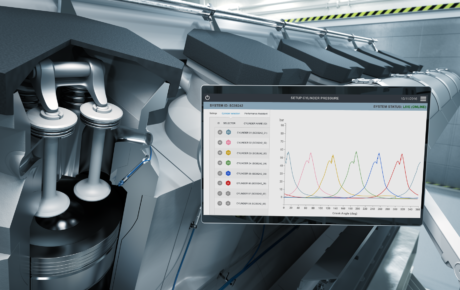Accurate measurement under extreme conditions thanks to Kistler Group
The Kistler Group has launched a new cylinder pressure sensor for the continuous monitoring of large marine and stationary engines. Used in four-stroke gas, dual-fuel and diesel engines in shipping as well as power stations, closed loop combustion control can achieve fuel savings of up to two percent annually. The new sensor 6635A1 from Kistler stands out for its high measuring accuracy under extreme conditions in the combustion chamber

Dual-fuel engines can be operated with natural gas or renewable fuels in addition to conventional liquid fuels, thus helping reduce fuel oil consumption and CO2 emissions. For dual-fuel engines to perform optimally, their combustion processes must be continuously monitored and controlled. This is the main application of the new 6635A1 cylinder pressure sensor. The sensors are used to monitor all cylinders simultaneously and provide accurate data. Knocking in the combustion chamber is determined just as precisely as the prevailing indicated mean effective pressure. The continuous monitoring of cylinder pressure enables closed loop combustion control, which results in increased engine performance as well as fuel savings. With the help of closed loop combustion control, fuel consumption can be reduced by approximately two percent per engine per year, amounting to an average reduction of 200 tons of hazardous CO2.
Continuous monitoring in the combustion chamber
In the combustion chamber, harsh conditions such as extreme mechanical shocks and vibrations, high temperatures and high pressures are at play. This requires particularly resilient sensors. To ensure reliable signal transmission, the 6635A1 cylinder pressure sensor utilizes welded connections instead of traditional plug connectors. Thus, mechanical shocks of up to 2000 g are no problem. The optimized diaphragm design minimizes the thermal shock error while enabling reliable peak pressure measurement up to 350 bar. PiezoStar crystals, which are grown specially by Kistler, are another new feature. They offer exceptional measurement stability and minimal temperature dependence in demanding environments. The sensors function reliably at temperatures of up to 350°C.

«Thanks to many years of experience in cylinder pressure measurement, Kistler guarantees reliable measurement data that can be used to detect problems early on and enable optimum control of the combustion process. Based on this measurement data, maintenance intervals can be optimized and downtimes can be planned», Miika Jussila, head of marine & stationary engines at Kistler, explains.
Operators of large marine and stationary engines thus benefit from high-quality measurement data, which can be used to optimize the combustion process. As a result, tons of fuel and CO2 emissions can be saved.
(Photo courtesy: Kistler group)



